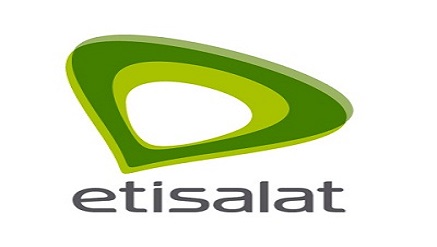Telecom
Etisalat Offers Subscribers Lifeline to End Unsolicited SMS

Etisalat Nigeria, has introduced the ‘Do-not-Disturb’ (DND) facility that enables customers on its network to opt-out completely or partially from receiving unsolicited marketing text messages and calls, in keeping with its tradition of providing exceptional customer experience.
Having identified improperly managed unsolicited marketing messages and calls as a major source of customer dissatisfaction within the Nigerian telecommunications industry, the industry regulator, the Nigerian Communications Commission (NCC), engaged network operators to develop effective solutions to address the issue.
As a direct result of this regulator-operator engagement, Etisalat has implemented the DND service which is designed to offer subscribers greater choice in determining the type and frequency of messages they receive.
Further to the recent NCC directive, the DND service is now available on the Etisalat network, using a uniform shortcode, 2442, across all networks for ease of access.
Subscribers on the Etisalat network, can therefore access the DND service by sending ‘STOP’ to 2442; customers can also request for a partial DND service which will allow them to receive only a specified class of messages that are of interest to them such as Sports, Religion, Health, etc.
To activate the partial DND service, customers are required to send ‘HELP’ to 2442 to receive information about the available classifications and their activation codes; then send the activation code to 2442 to activate a specific class of messages.
Speaking about the new service, Ikenna Ikeme, director, Regulatory and Corporate Social Responsibility, Etisalat Nigeria, highlighted the company’s enviable record of compliance with regulatory directives and reaffirmed Etisalat’s commitment to enhancing customer experience on its network.
“Our customers remain our priority at Etisalat Nigeria, because we recognize their preferences, not only in terms of the quality of products and services available to them, but also with regard to their experience on our network. Ensuring that the DND service is available on our network is one of the ways in which we continue to enhance our bouquet of services and enrich customer experience on the Etisalat network,” he said.
Ikeme added that the implementation of the DND service is also intended to encourage mutually responsible operator-customer relationship and sustainability of the telecommunications industry.
In just 7 years of operations, Etisalat Nigeria has become a major industry player with a growing subscriber base of over 22 million in a highly competitive market. Its portfolio of voice and data-centric products include – easy starter, easycliq, easybusiness, easyblaze, cliqlite, classic postpaid and easyflex; all tailor-made to meet the needs of its customers.
Etisalat Nigeria is one of the 19 operations of the Etisalat Group that spans across Africa, Middle East and Asia serving over 182 million subscribers; and it is committed to delivering innovative and quality services to its growing subscribers.
Telecom
Visa Launches Report on Digital Payment Landscape in Nigeria, Shows Positive Outlook

Visa, a global leader in payments, today announced the launch of a new report, ‘Value of Acceptance: Understanding the Digital Payment Landscape in Nigeria,’ which highlights substantial growth potential for digital payments, particularly among small and medium-sized enterprises (SMEs).

In Nigeria, digital payments are proving beneficial for surveyed SMEs, with nearly 90% believing that it boosts revenue and customer footfall. This growing confidence in digital transactions, especially cards, is coupled with a desire for further digitization, with 76% of cash-only SMEs planning to invest in new payment technologies.
The study also reveals that more than half of merchants already prefer digital payments, with 44% reporting lost sales due to customers’ lack of cash and 62% expressing concerns over fraud risk associated with cash.
Nigeria’s Digital Payments Momentum
An overwhelmingly positive outlook on digital payment investment emerged in the report, with 83% of merchants surveyed seeing this as a crucial component for growth, boosting sales, reducing fraud, and enhancing convenience among customers,
“Nigeria’s digital payments landscape is rapidly evolving, with a growing inclination towards digital transactions,” stated Andrew Uaboi, Vice President & Head, Visa West Africa.
“This transformation not only holds the promise of bolstering SMEs prosperity but can also help the economy to thrive.
“At Visa, we look forward to working together with our partners to further drive this transformation, enabling individuals, merchants, and businesses to grow and participate in the digital economy.”
Addressing Challenges to Unlock Full Potential
Unlocking digital payments’ full potential in Nigeria will require confronting key challenges. There is an overarching need to enhance financial literacy and raise awareness about the benefits of digital payments while also incentivizing their usage among customers.
With 76% of cash-only SMEs surveyed intending to get a point-of-sale (POS) device in the near future, an opportunity emerges to accelerate adoption through simplifying onboarding.
In addition, improving infrastructure to counteract concerns around payments failures (42%) can enhance confidence in digitization. To address fraud concerns, educational campaigns are vital to highlighting the robust security features of digital payments, especially the lower fraud risk associated with card payments.
Visa’s established cybersecurity capabilities can be instrumental to building trust across the digital payments landscape in Nigeria by helping to harness confidence across both the SME and consumer segments.
The Broader Value of Digital Payment Acceptance
Digital payments are crucial for Nigerian SMEs for a number of reasons including – boosting revenue through an increasingly cashless customer base, improving customer satisfaction with faster payments, and reducing operational risks by minimizing cash handling. Digital transaction records also provide valuable data that facilitate access to financing and stimulate growth.
While cash is still seen as quick and convenient, cards offer an advantage across expense tracking, spending encouragement, and enhanced security. Meanwhile, mobile and digital wallets offer an innovative and competitive edge. Promoting the adoption of preferred methods, particularly card payments, is crucial for driving growth.
Beyond direct benefits, digital payment adoption drives economic growth and financial inclusion, by connecting the unbanked to the formal financial system and enabling access to savings, credit, and insurance.
Research shows that the transition to the digital economy can generate 1-2% annual GDP growth; a mere 1% increase in card usage generates an average $67 billion annual increase in goods and services consumption across 70 countries and territories.
Visa: A Partner in Driving Digital Payment Adoption
Visa is uniquely positioned to support Nigeria’s transition to a more digital economy. As a trusted advisor and partner, Visa offers a range of capabilities to help governments, financial institutions, businesses, and technology providers enhance their digital payment acceptance maturity.
Visa’s suite of solutions includes programs for specific merchant segments, innovations like Tap to Phone, Contactless Payments and Click to Pay, and resources educating businesses about the benefits of digital payments.
About the Visa Value of Acceptance report
Visa’s ‘Value of Acceptance: Understanding the Digital Payment Landscape in Nigeria’ report, conducted by 4Sight Research & Analytics, examines the current state of digital payment acceptance, exploring both opportunities and challenges. The findings are based on face-to-face interviews with 250 SME owners/managers who are key decision-makers with respect to day-to-day business decisions.
Telecom
Gombe Commissioner of Police Visits GBB Command Centre, Strengthens Collaboration on ICT-Driven Security Solutions

Galaxy Backbone (GBB) Limited welcomed the newly appointed Commissioner of Police for Gombe State, CP Bello Yahaya, on a courtesy visit to its North East Regional Office and Safe City Emergency Command Centre.

This visit underscored the growing synergy between law enforcement and technology-driven solutions in strengthening security operations and fostering digital transformation in the region.
During the visit, CP Bello Yahaya was received by Mr. Ibrahim Bello, Regional Coordinator of GBB North East Regional Office, alongside key members of the GBB team.
The engagement provided a platform to explore strategic collaborations aimed at enhancing security infrastructure, digital transformation, and capacity-building initiatives for the Gombe State Police Command.
The Commissioner was taken on a guided tour of the Safe City Emergency Command Centre, a state-of-the-art facility that forms a critical part of the National Information and Communications Technology Infrastructure Backbone (NICTIB) project.
The centre plays a pivotal role in improving security architecture across Gombe State and the North East region, leveraging cutting-edge surveillance systems, real-time monitoring tools, and integrated emergency response mechanisms.
With its advanced Unified Communications System, security analytics, and digital emergency response coordination, the Safe City Command Centre provides law enforcement with real-time intelligence, proactive threat detection, and seamless inter-agency collaboration, enabling a more effective and responsive approach to public safety.
CP Bello Yahaya expressed keen interest in leveraging ICT solutions to strengthen policing efforts, emphasizing the importance of technology in modern crime prevention, data-driven policing, and crisis management.
He highlighted the need for enhanced digital transformation, improved connectivity, and expanded training programs to equip officers with the necessary skills to operate effectively in a digitally evolving security landscape.
Galaxy Backbone reaffirmed its commitment to supporting law enforcement agencies, government institutions, and critical stakeholders through innovative ICT solutions, secure cloud infrastructure, and digital training programs.
By providing access to high-speed connectivity, cybersecurity frameworks, and cloud-powered command centres, GBB continues to drive the adoption of smart policing solutions and enhanced security management across Nigeria.
The visit concluded with a shared commitment to deepening engagement between Galaxy Backbone and the Gombe State Police Command, focusing on optimizing digital transformation initiatives for law enforcement efficiency, expanding the scope of ICT-driven surveillance and emergency response systems and strengthening training programs for officers to enhance digital skills and operational effectiveness.
As Nigeria’s leading digital infrastructure provider, Galaxy Backbone continues to shape the future of public safety, digital governance, and cybersecurity, ensuring that law enforcement agencies have access to the best tools to protect lives and property.
Telecom
Salesforce Collaborates with Tech Leaders to Launch AI Energy Score for Model Efficiency

Salesforce, in collaboration with Hugging Face, Cohere, and Carnegie Mellon University, announced the release of the AI Energy Score, a first-of-its-kind benchmarking tool that lets AI developers and users evaluate, identify, and compare the energy consumption of AI models.

Salesforce also announced it will be the first AI model developer to disclose the energy efficiency data of its proprietary models under the new framework.
The AI Energy Score aims to address the lack of transparency about the environmental impact of AI models. Similar to how ENERGY STAR transformed energy efficiency standards for appliances and electronics, this initiative establishes a clear, trusted benchmark for AI model sustainability.
“Reducing AI energy consumption lowers operational costs, optimises infrastructure, and enhances long-term sustainability and profitability. We are proud to work with industry leaders to build a more transparent AI ecosystem,” says Linda Saunders, Salesforce Country Manager and Senior Director of Solution Engineering for Africa.
The AI Energy Score will debut at the AI Action Summit, where leaders from over 100 countries, the private sector, and civil society will convene to harness AI for good. By enhancing transparency, the score can drive market preference for efficient models and incentivise sustainable AI development. Recognised by the French Government and the Paris Peace Forum for its transformative potential, the AI Energy Score features:
Standardised Energy Ratings: A standardised framework for measuring and comparing AI model energy efficiency.
Public Leaderboard: A comprehensive leaderboard that features scores for 10 common AI tasks — such as text generation, image generation, and summarisation — performed by 166 models, including Salesforce’s SFR-Embedding, xLAM, and SF-TextBase.
Benchmarking Portal: A platform where AI developers can submit their open or proprietary AI models to be evaluated and added to the leaderboard. Open models can be automatically tested, while closed models can be evaluated through a secured testing sandbox.
Recognisable Energy Use Label: A new 1- to 5-star label that rates AI model energy use, with five stars indicating the highest efficiency. This helps developers and users easily identify and choose more sustainable models. Once rated, AI developers can generate standardised labels to share their models’ energy score, with built-in guidance on the proper label display for visibility and impact.
Last year, the company introduced Agentforce, the agentic layer of the Salesforce Platform for deploying autonomous AI agents across any business function. Agentforce offers tools to build and customise agents, as well as a library of ready-to-use skills for sales, service, marketing, commerce, Tableau, Slack, and more.

 E-Business2 days ago
E-Business2 days agoSchmidt, Ex Google Chief Says AI Risky in Terrorist Hands

 News2 days ago
News2 days agoFG Order MDAs to Close Commercial Banks’ Accounts, Enforce TSA Policy

 Telecom2 days ago
Telecom2 days agoBreaking….Tariff Hike: MTN Apologizes to Nigerians but Silent on Reversal

 News3 days ago
News3 days agoIFC Partners Mohinani Group to Drive Plastic Recycling and Manufacturing in Nigeria, Ghana

 Telecom3 days ago
Telecom3 days agoAngst over Telecom Tariff Hike as Subscribers Demand Sanctions, Labour Orders Boycott

 News3 days ago
News3 days agoNDLEA Says 14m Nigerians Affected by Consumption of Harmful Drugs

 News3 days ago
News3 days agoNBRDA Investigates Biocatalysts for Bioethanol Production

 E-Business3 days ago
E-Business3 days agoOpenAI CEO Rejects $97.4Bn Takeover Bid from Elon Musk















